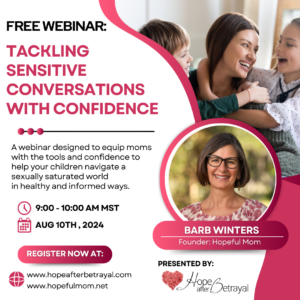Until a few years ago, I almost never said “pornography.” If absolutely necessary to use this word, I whispered and practically choked on it as it exited my mouth. I didn’t want to talk about pornography, nor did I think it proper.
When discussing explicit images, I used the phrase “inappropriate pictures” and assumed others understood. Even then, I lowered my voice, spoke to the ground, and blushed. It was uncomfortable.
When my son first said, “I was watching porn,” it was weird. I was taken aback by his knowledge of the word. Besides all the other emotions I experienced, his vernacular confounded me. My teenager uttering the word porn, especially to me, was more than odd. But the fact that he was willing to talk with me meant I had to be willing to talk to him.
How do we get past the awkwardness?
How do we add words like sex, sexuality, and pornography into our vocabulary so we can talk about them calmly and easily, especially with our children?
I work for a non-profit organization, educating students at local schools about making healthy choices and avoiding risky behaviors, one of which is sexual activity. It took me a long minute to find my groove. The first few times I referred to sex in my presentation, I was noticeably embarrassed. Then I swung the other direction, boldly and bravely attempting to imitate my younger co-workers. I threw the word around with some attitude, like I was cool. But the kids saw through that smokescreen. One girl wrinkled her nose as I stated that sex within marriage is more fulfilling than outside of marriage. I don’t think she expected a perceived-as-old lady to talk about sex in that manner. But I think my swagger seemed more out of place than the information I was disseminating.
However, the more I talked about sexual activity, the more comfortable I became with the terms and explanations. I no longer squirm—or act like a youngster. I’m me. The students view me more as a mother figure than the big sister type. And I’m good with that.
Inevitably, the first time I mention pornography in the classroom, the students snicker. I expect the laughter now and ignore the reactions or lean into them, pausing a moment, allowing the group to absorb the word and realize that, yes, she just went there.
So, how did I become comfortable talking about pornography? I talked about it.
At some point, I realized talking about porn and its harms is more important than remaining comfortably quiet. I stepped out of my comfort zone, opened my mouth, and said the word—awkwardly at first. I even practiced saying “pornography” out loud to myself so it became more natural. Then I began.
The Conversations
The first discussions about pornography were with my son, the one who confessed. We had several conversations in which we stuttered, turned our heads away from each other, shuffled from one foot to the other, and sweated through it. I even stated the obvious, “I know this is a difficult conversation, but it’s important. I know I’m not doing a great job at this, but I want to be here for you.”
Then I branched out to my other children, being direct with the older ones. I asked if they had seen pornography and let the conversation develop from there. Eventually, as I researched and began writing about the harms of pornography, discussions with friends and neighbors became easier.
Here are some tips to help you have these sensitive conversations:
- Practice saying “pornography,” “sex,” and related words out loud. I know it sounds corny, but practice helps you become more comfortable with the terminology.
- Have regular conversations with your child(ren). Talk about it openly and frequently, starting at a young age. Bring it up while engaged in another activity or at the dinner table. When you hear questionable song lyrics or see something while watching a video, ask what they think about it. The objective is for our precious children to realize this is a topic mom and dad are willing to discuss.
- Share information as you learn. For example, if you watch a YouTube video about the brain and pornography, tell them what you learned and share the link.
- Don’t give up—even if you feel like you’re talking to a brick wall. Your children may not respond well. That’s okay. Keep trying.
Our children are amazing human beings, and it’s our job to help them become mature healthy adults. Let’s do our best to walk with them, bolster their confidence, and equip them with the skills necessary to succeed. Keep talking!
Barb Winters is a Sexual Risk Avoidance Educator, mental health coach, author of Sexpectations: Helping the Next Generation Navigate Healthy Relationships, and founder of Hopeful Mom.
To learn more about how to Tackle Sensitive Conversations join us on Saturday, August 10th for a FREE webinar with special guest, Barb Winters. Barb will be there with practical tools designed to equip you to help your children navigate a sexually saturated world in healthy and informed ways.
Click Here to Register Now

